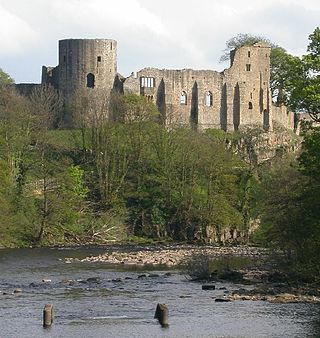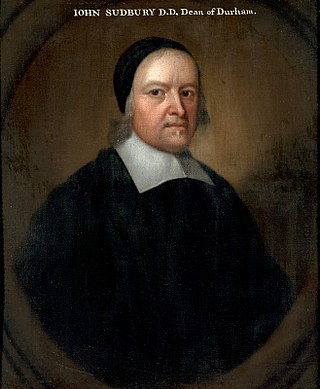Related Research Articles
Geoffrey Rufus, also called Galfrid Rufus was a medieval Bishop of Durham and Lord Chancellor of England.

Raby Castle is a medieval castle located near Staindrop in County Durham, England, among 200 acres (810,000 m2) of deer park. It was built by John Neville, 3rd Baron Neville de Raby, between approximately 1367 and 1390. Cecily Neville, the mother of the Kings Edward IV and Richard III, was born here. After Charles Neville, 6th Earl of Westmorland, led the failed Rising of the North in favour of Mary, Queen of Scots in 1569 Raby Castle was taken into royal custody. Sir Henry Vane the Elder purchased Raby Castle in 1626 and neighbouring Barnard Castle from the Crown, and the Earls of Darlington and Dukes of Cleveland added a Gothic-style entrance hall and octagonal drawing room. From 1833 to 1891 they were the Dukes of Cleveland and they retain the title of Lord Barnard. Extensive alterations were carried out in the 17th and 18th centuries. It is famed for both its size and its art, including works by old masters and portraits. After 1733 it was frequented from his young age of eleven by the poet Christopher Smart, who eloped briefly at the age of thirteen with Anne Vane, daughter of Henry Vane, who succeeded to the Barnard title. It is a Grade I listed building and open to the public on a seasonal basis.
Hugh de Puiset was a medieval Bishop of Durham and Chief Justiciar of England under King Richard I. He was the nephew of King Stephen of England and Henry of Blois, who both assisted Hugh's ecclesiastical career. He held the office of treasurer of York for a number of years, which led him into conflict with Henry Murdac, Archbishop of York. In 1153, Hugh was elected bishop of Durham despite the opposition of Murdac.

Great Lumley is a village in County Durham, England. It is situated south east of Chester-le-Street, near Lumley Castle. It has a population of 3,843, reducing to 3,684 at the 2011 census.

Embleton is a hamlet, township and former chapelry, in County Durham, in England, as well as the site of a medieval village and manor. It is situated 3 miles (5 km) east of Sedgefield and 4 miles (6 km) west of Hartlepool. The township was historically named "Elmdene", supposedly derived from the site's proximity to a woodland of elm trees which, at an earlier time, flourished in the bordering dene. A single farmstead now occupies the site which lies adjacent to the ruins of a small church dedicated to the Virgin Mary.

Hurworth-on-Tees is a village in the borough of Darlington, within the ceremonial county of County Durham, England. It is situated in the civil parish of Hurworth. The village lies to the south of Darlington on the River Tees, close to its meeting point with the River Skerne, and immediately adjoins the village of Hurworth Place, which forms part of the same civil parish.

Brian Mackenzie, Baron Mackenzie of Framwellgate, is a former British Labour and now non-aligned member of the House of Lords. He is the former President of the Police Superintendents' Association.

Bowes Castle is a medieval castle in the village of Bowes in County Durham, England. Built within the perimeter of the former Roman fort of Lavatrae, on the Roman road that is now the A66, the early timber castle on the site was replaced by a more substantial stone structure between 1170 and 1174 on the orders of Henry II. A planned village was built alongside the castle. Bowes Castle withstood Scottish attack during the Great Revolt of 1173–74 but was successfully looted by rebels in 1322. The castle went into decline and was largely dismantled after the English Civil War. The ruins are now owned by English Heritage and run as a tourist attraction. There is free admission during daylight hours.

The Bishop of Durham is the Anglican bishop responsible for the Diocese of Durham in the Province of York. The diocese is one of the oldest in England and its bishop is a member of the House of Lords. Paul Butler has been the Bishop of Durham since his election was confirmed at York Minster on 20 January 2014. The previous bishop was Justin Welby, now Archbishop of Canterbury. The bishop is one of two who escort the sovereign at the coronation.
William of St. Barbara or William of Ste Barbe was a medieval Bishop of Durham.
Robert of Holy Island was a medieval Bishop of Durham.
Richard Kellaw or Richard de Kellawe was an English Benedictine monk and Bishop of Durham. He was elected on 31 March 1311, and was consecrated on 30 May 1311. He died on 9 October 1316. In the 19th century, a grave identified as his was excavated in the Durham Cathedral Chapter House.

Barnard Castle is a ruined medieval castle situated in the town of the same name in County Durham, England.
A chare, in the dialect of North-east England, is a narrow medieval street or alley.
Richard de Sancta Agatha was an English medieval churchman and university chancellor.

John Sudbury was Dean of Durham from his installation on 15 February 1661 until his death on 29 November 1684. He was born at Bury St Edmunds in 1604, educated at Emmanuel College, Cambridge and ordained in 1629. He was Vicar of Leigh, Kent from 1639 to 1642 and a Prebendary of Westminster from 1660 to 1661.
Richard Hunt was Dean of Durham from his installation on 29 May 1620 until his death on 2 November 1638.
Alexander Augustin Donald MacKenzie was Provost of St Andrew's Cathedral, Inverness from 1918 to 1949.
The Ven. Henry Egerton (1729–1795) was Archdeacon of Derby from 1769 until his death.
References
- ↑ The Dependent Priories of Medieval English Monasteries; Heale, M.: Rochester (NY), Boydell & Brewer, 2004 ISBN 9781843830542
- ↑ An Historical, Topographical, and Descriptive View of the County Palatine of Durham; Mackenzie, E.; Ross, M.: Newcastle upon Tyne, Mackenzie and Dent, 1834
- ↑ Consecration details